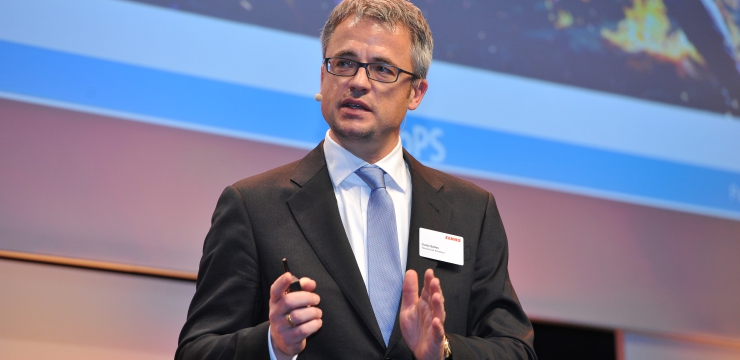The need for corporate entrepreneurship has become more and more important in order to stay in the game. In reality, corporate organizations are dealing with problems that arise from controlling processes, corporate culture and in-the-box-thinking. How can they overcome these hurdles? How to find a different approach, what’s the secret ingredient of startups? Corporate Startup Summit tries to find these answers. Therefore we are introducing particular speakers to give you deep insights about what they do and what they will teach.
In his professional background, Guido Baltes, Director of the IST Institute for Strategic Innovation ( www.innovationsinstitut.org ), combines both corporate and entrepreneurial activities: He acts and has acted as founder and co-founder of several start-up companies, amongst others coliquio.de, Germany’s largest network for health care experts. Before joining the university, he was responsible for strategy and marketing in the management board of one of Germany’s top three IT services companies.
Combining both, he supports major industrial companies in building up entrepreneurial corporate startup teams, leadership practices and management systems to successfully launch strategic innovation.

Mr. Guido Baltes, thanks for having you! As you are a professor at the Institute for Strategic Innovation & Technology Management, you are very deep into the topic of Corporate Entrepreneurship. What characterizes Corporate Entrepreneurship for you?
Over the past decades the focus on corporate entrepreneurship increased as a result of increased market volatility. Corporates are put under pressure by radical innovation that is changing their traditional market’s parameters fundamentally. Resulting in the progressive digitalization, these changes continue to accelerate.
Due to the nature of this radical type of innovation, characterized by high uncertainty and high risk profiles, they pose a challenge to corporates – which do acknowledge this challenge, but are often characterized by high bureaucracy, long decision making processes and a culture of stability. They face significant barriers that they struggle to overcome.
Naturally, corporates have thus been taking a closer look at startups as they seemingly represent entities that are better suited for tackling radical innovation: Highly adaptive, fast acting organizations with highly specialized knowledge. And corporates have taken different angels on adopting that. However, corporate venture capital and corporate incubation initiatives in a lot of cases did not show the desired impact.
We perceive corporate entrepreneurship in this context as a top down strategic initiative for organizational innovation. Corporate entrepreneurship here supports the strategic renewal of a corporate and the strategic creation of new businesses, while a larger part of the organization may go on improving the existing ones. With this, corporates aim at implementing semi-autonomous subunits, embedded entrepreneurial teams that are empowered and provided with autonomy for acting as a venture but at the same time profit from a resourceful link to the corporate organization. This link, the interface between these teams and corporate, is what proves to be the crucial part – both for the performance and success of these teams as well as the successful strategic renewal of the corporate.
You are a researcher. Do you currently research on probable connections between corporates and startups or how they can learn from each other?
Our research focuses on the embedded entrepreneurial team as a separated subunit and the importance of implementing ambidexterity in corporate organizations. From our perspective, corporates in the age of digitalization are faced with the challenge of having to improve the efficiency of their “traditional” business in order to keep competitiveness and profitability there. At the same time however, they simultaneously need to create new businesses leveraging know-how, competencies and business models that may emerge far-off their home turf.
The true challenge here from our point of view is the integration within the same organization: The start-up type of organizations that one may favor for building new businesses and the rather hierarchy type of organizations established for enhancing the “traditional” businesses have negative externalities. This is why the embedded entrepreneurial team has to be “protected” from negative impacts from the corporate organization – while it still needs to be closely linked in order to be able to leverage the corporate’s valuable assets and fostering the corporate’s strategic renewal.
Therefore, we regard the organizational design of the interface between the embedded entrepreneurial team and the corporate organization as the most crucial part for successful corporate entrepreneurship initiatives. This is confirmed by our research that we initially did, based on a quantitative study that covered 2.000 tech-companies in Germany. We are now deepening our insights based on larger-scale case study research that uses semi-structured in-depth interviews.
Next to the autonomy dimension, i.e. what is the degree and the dimensions of autonomy needed by corporate startup teams to be successful, we additionally identified the “corporate entrepreneur” skill set and characteristics to be crucial for success.
You want to experience Mr. Guido Baltes live, come to the International Corporate Startup Summit in Zurich!
How do you teach Corporate Entrepreneurship, how do you emphasize the importance of it to your students?
We do teach entrepreneurship and corporate entrepreneurship at different levels, both in Bachelor and Master programs. Our teaching touches methodology parts as well as the entrepreneurial mindset. We aim at motivating students to take entrepreneurial initiative, either by forming their own venture or engaging in entrepreneurial initiatives at their future employers.
With this, we try to mirror our findings, that the “corporate entrepreneur”, the entrepreneurial leader of an embedded entrepreneurial team is a vital role for making corporate entrepreneurship initiatives successful. First of all, the corporate entrepreneur is a “role” in which such a person acts as the leader of the team as well as the linking pin between the team and the corporate organization.
We have conducted a significant number of case studies and findings from here, which show that corporate entrepreneurs need a specific skill set to fill this role successfully, spanning from analytical, leadership, stake holder management to transparent problem solving skills.
At the same time however, based on our findings, successful corporate entrepreneurs seem to share personal characteristics that are typically described for “entrepreneurs”. Examples for this are proactiveness, passion for work and self-efficacy and the like. However, they also differ substantially from a “typical” entrepreneur profile in that they embrace a rather medium level of risk taking and balance intrinsic and extrinsic motivation as well as trustworthiness.
We aim for discussing these findings in a workshop at the summit in Zurich.
What do you want the attendees at the International Corporate Startup Summit in Zurich to take along?
As we have been discussing with a lot of companies and have meanwhile interviewed numerous cases, we conclude from there that the current age of digitalization poses strategic challenges to corporates that do not seem to be tackled in a promising way when using a “traditional” strategic management tool set. Amongst others, these challenges are posed as a complex phenomenon which is quite different from complicated ones: While you analyze, the context continues to change continuously. This may lead to endless analytical loops or a misleading simplification – neither a promising alternative.
Corporate entrepreneurship initiatives in contrast provide an alternative that explores this complexity challenge, not from an analytical point of view but with a more effectuation type of approach: While iterating and struggling to create and build up the new business, corporate startups create experiments and aggregate learning experiences that not only, hopefully, result in a new business but more than that enable the corporate organization to better understand how to adapt and leverage existing competences and assets into radically new business models.
This pitch may be fast-selling – but the promise is not held easily. Implementing corporate entrepreneurship successfully and sustainably is not easy to achieve. It needs awareness for the necessary prerequisites as well as the to-be-expected upcoming conflicts on the corporate side. At the same time it needs specific skill sets and characteristics on the corporate startup team, in particular at the corporate entrepreneur.
I would love to see attendees at the corporate startup summit to realize the fascinating chances that are provided with this type of strategic initiatives. At the same time, it would be good to realize that successful implementation is by no means a matter of course. In contrast, it needs specific knowledge, skills and individuals. There should be numerous opportunities at the Corporate Startup Summit to get a least a glimpse of insight into these necessities as well as the fascinating chances of this idea.
Guido Baltes created the eArchitecture Living Lab @ Lake Constance University, one of the first European Living Labs in the European Network of Living Labs. Implementing agile and open innovation practices, this Innovation Lab serves amongst others as an incubation environment. Here, his research deals with technology strategy, strategic innovation and corporate entrepreneurship; currently focusing on corporate startups teams as a means of implementing organizational ambidexterity.
In that, he is currently building a representative sample of corporate startup cases that aggregates in-depth interview data from more than 70 corporate startups teams and more than 300 interviews. Based on that, he is currently identifying critical elements of the successful corporate entrepreneur as well as examining the leadership practices at the interface of corporate organizations and corporate startups teams.

